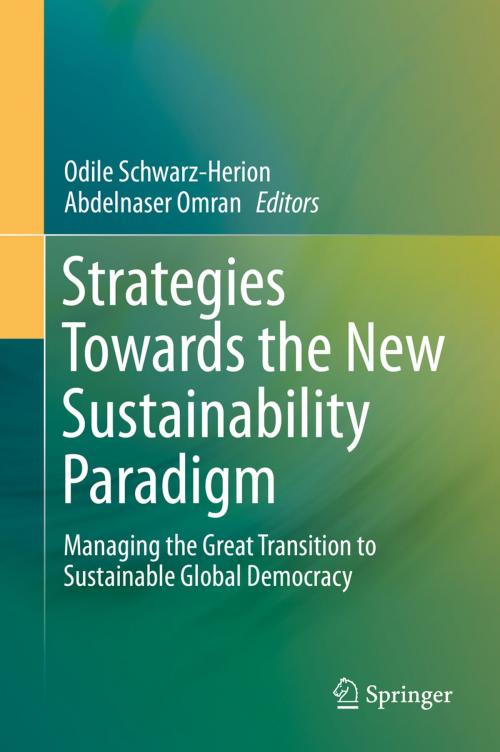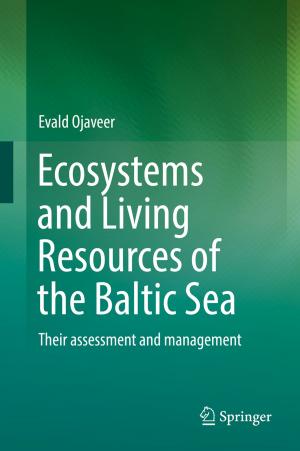Strategies Towards the New Sustainability Paradigm
Managing the Great Transition to Sustainable Global Democracy
Nonfiction, Science & Nature, Science, Biological Sciences, Ecology, Environmental Science, Nature| Author: | ISBN: | 9783319146997 | |
| Publisher: | Springer International Publishing | Publication: | March 30, 2015 |
| Imprint: | Springer | Language: | English |
| Author: | |
| ISBN: | 9783319146997 |
| Publisher: | Springer International Publishing |
| Publication: | March 30, 2015 |
| Imprint: | Springer |
| Language: | English |
On a historical global turning point, this book offers a thorough exploration of the “New Sustainability Paradigm”, originally developed by the Global Scenario Group (GSG) of the Stockholm Environmental Institute (SEI) as a starting point for analyzing real-life transitions and transformations. 11 contributors from 5 continents present detailed analyses of economic and political transitions in Western and Eastern Europe, the USA, the Middle East, and in Asia, discussing the role of different players in the implementation of the New Sustainability Paradigm.
Part I offers an overview of the six scenarios developed by the GSG and a short discussion of significant papers published by the Great Transition Initiative (GTI) of the Tellus Institute. Next come examples of dramatic historical and current transitions in Western Europe, the USA, Eastern Europe, the Middle East (Arabian Spring), and Asia, as well as an analysis of the potential of humankind to manage a great transition to the new sustainability paradigm. Subsequent chapters highlight the role of culture and education and review the role of different players for the implementation of the new sustainability paradigm. The focus of Part II is on the ecological pillar of Sustainability. The discussion includes urgent ecological problems including climate engineering, eco-criminality, bioterrorism, biodiversity protection, water, energy, and food security. Part III deals with needed innovations in sustainable waste management and sustainable city architecture, especially big cities in developing and threshold countries, where a significant part of the world population is concentrated. The fourth and final section offers an analysis of insights developed throughout the book, and outlines recommendations for the implementation of the New Sustainability Paradigm by civil society, grass-root movements, scholars, politically neutral NGOs, sincere media players, and by open-minded and enlightened politicians to manage and steer the Great Transition towards sustainable global democracy.
On a historical global turning point, this book offers a thorough exploration of the “New Sustainability Paradigm”, originally developed by the Global Scenario Group (GSG) of the Stockholm Environmental Institute (SEI) as a starting point for analyzing real-life transitions and transformations. 11 contributors from 5 continents present detailed analyses of economic and political transitions in Western and Eastern Europe, the USA, the Middle East, and in Asia, discussing the role of different players in the implementation of the New Sustainability Paradigm.
Part I offers an overview of the six scenarios developed by the GSG and a short discussion of significant papers published by the Great Transition Initiative (GTI) of the Tellus Institute. Next come examples of dramatic historical and current transitions in Western Europe, the USA, Eastern Europe, the Middle East (Arabian Spring), and Asia, as well as an analysis of the potential of humankind to manage a great transition to the new sustainability paradigm. Subsequent chapters highlight the role of culture and education and review the role of different players for the implementation of the new sustainability paradigm. The focus of Part II is on the ecological pillar of Sustainability. The discussion includes urgent ecological problems including climate engineering, eco-criminality, bioterrorism, biodiversity protection, water, energy, and food security. Part III deals with needed innovations in sustainable waste management and sustainable city architecture, especially big cities in developing and threshold countries, where a significant part of the world population is concentrated. The fourth and final section offers an analysis of insights developed throughout the book, and outlines recommendations for the implementation of the New Sustainability Paradigm by civil society, grass-root movements, scholars, politically neutral NGOs, sincere media players, and by open-minded and enlightened politicians to manage and steer the Great Transition towards sustainable global democracy.















